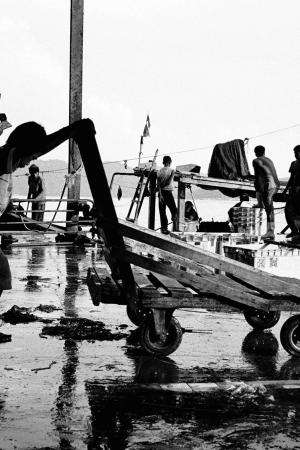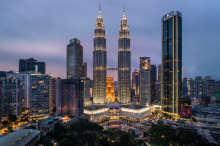“The impact of statelessness can be seen through many facets; one being the most crucial is the dire need to earn a living without being discriminated through low wages, long hours and dangerous jobs”.
Professor Dato’ Noor Aziah Mohd Awal, Human Rights Commission of Malaysia (SUHAKAM)
KEY ISSUES
- Several groups are affected by or at risk of statelessness in Malaysia, including indigenous peoples, foundlings and children impacted by gender discriminatory nationality laws, refugees, migrants and their descendants as well as people who came to or were brought to Malaya prior to Independence in 1957, or to the British Crown Colonies of Sarawak and North Borneo (now Sabah) prior to the formation of the Federation of Malaysia in 1963.
- Gender discrimination persists in Malaysia’s citizenship laws: Malaysian women cannot confer citizenship automatically on their children born outside the country.
- Although the Malaysian constitution contains safeguards to prevent childhood statelessness, including for foundlings, these are ineffective in practice due to poor implementation.
- Constitutional amendments are being considered that would grant equal citizenship rights to children born overseas to Malaysian women, but would narrow the scope of safeguards against childhood statelessness and make it harder for other groups to access citizenship.
- Malaysia has not acceded to either of the UN Statelessness Conventions, nor is it a state party to the ICCPR and the ICERD. It also maintains reservations on provisions relating to the right to a nationality in the CRC (Article 7), CEDAW (Article 9) and CRPD (Article 18).
STATELESSNESS IN MALAYSIA
Statelessness is a widespread phenomenon in Malaysia. Among the groups at risk of or affected by statelessness in the country are: people who have resided in Malaysia since pre-independence as well as their descendants but were not able to acquire or establish citizenship (including individuals of Tamil ethnicity and populations in East Malaysia), children of mixed-nationality marriages (through the impact of gender discriminatory citizenship laws), indigenous peoples (including mobile maritime populations and Orang Asli communities), refugees and migrants (especially in the context of irregular migration) and their children, foundlings and abandoned children, and other people who lack documentation.
Malaysia has the third largest reported stateless population in Southeast Asia, with 117,070 stateless people in the country at the end of 2023, according to UNHCR. This figure does not capture everyone who is affected by statelessness in the country, but comprises 107,678 stateless Rohingya in Malaysia and 9,392 non-displaced stateless persons in West Malaysia “who may be entitled to Malaysian nationality under the law”. Between 2016 and June 2023, over 16,000 stateless people in West Malaysia were registered in a mapping exercise conducted by Development of Human Resources for Rural Areas (DHRRA) Malaysia. An estimated 7,000 have been recognised as Malaysians, while 9,392 remained stateless. These figures only account for cases of statelessness that relate to the pre-independence context and childhood statelessness cases (such as foundlings/abandoned children, stateless children adopted by Malaysians and children born out of wedlock to Malaysian fathers) and do not include stateless people in Sabah and Sarawak (East Malaysia) or the West Malaysian states of Kelantan and Terengganu.
Pre-independence arrivals in Malaysia include mainly Indian and Chinese migrants and their descendants who arrived in the country through a labour recruitment system. Currently, a significant proportion of communities, mostly of Indian Tamil origin, lack the necessary documentation that would allow them to prove their intergenerational links to Malaysia and their Malaysian citizenship. This is because they have historically faced significant barriers in accessing civil documentation, due to the discriminatory application of laws and policies and their isolation.
While previously welcomed and supported by Malaysia, Rohingya refugees and asylum seekers have never gained full and effective protection. In recent years, Rohingyas in Malaysia are facing increasing discrimination and abuse, including arrest and detention. Rohingya refugees who have tried to reach Malaysia by sea have also been pushed back by the Malaysian authorities. Since there are no opportunities for Rohingyas to regularise their legal status over time, the precariousness of work, education and health for stateless Rohingyas is experienced across multiple generations.
Malaysia has not acceded to either of the UN statelessness conventions and has no statelessness determination procedure or protection system in place. Statelessness and gender-discriminatory citizenship laws have far-reaching and deeply detrimental consequences on the enjoyment of other human rights for the individuals and families affected in Malaysia. Stateless and non-citizen children face challenges enrolling into the national school system, despite the establishment of the Zero Reject Policy in 2018. This policy still requires one parent to be a Malaysian citizen with an identification card, which excludes stateless children without a citizen parent or whose parents lack documentation. Stateless children and non-citizen children with a Malaysian parent can access public health care but do not qualify for subsidised rates that are available to citizens. Stateless people face difficulties in accessing formal employment leading to many resorting to working in the informal sector or dangerous jobs with a high risk of exploitation. Stateless people are also unable to access basic services such as opening bank accounts, holding a driver’s licence or accessing telecommunication services, making it difficult for them to participate fully in society. Without access to legal documentation, stateless persons, especially the Bajau Laut community, also face a lack of access to fundamental services such as clean water and electricity.
THE RIGHT TO NATIONALITY IN MALAYSIA
The Federal Constitution of Malaysia provides the primary legal framework for the acquisition and loss of Malaysian nationality. Citizenship can be acquired by birth, registration or naturalisation, combining jus sanguinis and jus soli elements. The Constitution contains safeguards against statelessness, providing that “every person born within the Federation who is not born a citizen of any country otherwise than by virtue of this paragraph” is a citizen by operation of law (Section 1(e) of Part II of the Second Schedule). This means that irrespective of the parents’ citizenship, all stateless individuals born in Malaysia, who have not obtained any other citizenship, should automatically be entitled to citizenship. The Constitution also grants citizenship automatically to foundlings and abandoned children (Section 19(B) of Part III of the Second Schedule, read with Section 1(a) of Part II of the Second Schedule) and the Adoption Act recognises adopted children as having the same legal standing as biological children (Section 9(1) of the 1952 Adoption Act). However, these safeguards have proven to be ineffective, due to the absence of administrative guidelines for implementation and the lack of adherence to the legal safeguards by implementing bodies.
Obtaining a birth certificate is a crucial prerequisite for acquiring other identity documents and citizenship in Malaysia. Registration is not automatically granted at the time of birth. Instead, individuals are required to actively register their births with the National Registration Department of the Malaysian Government to obtain a birth certificate. Lack of timely birth registration and parents’ marriage registration status contributes to the issue of statelessness.
Malaysian women do not have equal rights as men to confer automatic citizenship on their children born outside the country. Malaysian men can rely on Sections 1(b) and 1(c) of Part II of the Second Schedule of the Federal Constitution which state that a person born outside Malaysia is a citizen by “operation of law” if the father is a citizen. Malaysian women must rely on Article 15(2), where citizenship is by application – an arbitrary and inconsistent process in practice, filled with delays and a slim chance of approval. Malaysian women are also denied the right to confer nationality on a non-citizen spouse. Malaysian men can confer citizenship on their spouse after two years of residence in the country but the spouse of Malaysian women can only access citizenship by naturalisation, which is available to any non-Malaysian and requires twelve years of residence.
Children born outside a legally recognised marriage to Malaysian fathers and non-Malaysian mothers do not have the right to inherit Malaysian citizenship. Malaysian fathers rely on article 15A which foresees that the Federal Government can in special circumstances register any person under the age of twenty-one years as a citizen. However, this Article has not been prioritised to register stateless persons. In the case of CTEB & Anor. v Ketua Pengarah Pendaftaran Negara Malaysia & Ors., the Federal Court ruled in May 2021 that an “illegitimate” child born outside Malaysia to a Malaysian biological father and a non-Malaysian mother is not entitled to become a Malaysian citizen by operation of law.
THE PROSPECT OF CONSTITUTIONAL REFORM IN MALAYSIA
Malaysia has seen considerable litigation and mobilisation around childhood statelessness, indigenous and migrant communities’ access to citizenship as well as gender discriminatory citizenship laws. Malaysian women, supported by civil society and lawyers’ groups, have engaged in extensive campaigning for equal citizenship rights. One technique that has been used to challenge the gender discriminatory system has been litigation before the courts – a strategy that has met with mixed success. In the landmark case of Suriani Kempe & Ors v Government of Malaysia & Ors, the Kuala Lumpur High Court ruled that the Malaysian constitution should be read as granting Malaysian women equal rights in the transmission of citizenship to their overseas born children. However, this was later overturned in a 2-1 decision following the Government’s appeal and the case has proceeded to the Federal Court. In the meantime, the Malaysian Government committed to enact law reform that would grant equal citizenship rights to children born overseas to Malaysian women.
In early 2023, the Malaysian Government announced its intention to amend the Constitution to enable children born overseas to Malaysian mothers to access citizenship automatically. It later emerged that the government also intended to remove Section 1(e) of Part II of the Second Schedule as part of a longer list of citizenship amendments. If this provision is removed, it will further deprive stateless children of their pathway to citizenship, potentially leading to an increase in statelessness in Malaysia. Similarly, Section 19(B) is set to be amended, replacing the existing provision of automatic citizenship for foundlings with a discretionary application process that places the burden of proving statelessness on the child. In June 2023, two committees were established to study the proposed amendments. However, concerns have been raised regarding the lack of transparency and inclusive consultation with stakeholders on the proposed amendments. Following media attention on this, several civil society organisations were invited to a consultation where the proposed amendments were revealed. However, the draft amendment itself remains undisclosed to the general public and civil society groups. In the meantime, the Ministry of Home Affairs has announced efforts to prioritise the processing of applications for Malaysian citizenship of adopted children and those born before independence. The Ministry aims to resolve at least 10,000 applications in 2023 and has implemented a shorter processing period to expedite decision-making.
THE BAJAU LAUT COMMUNITY
The Bajau Laut, a coastal and sea-faring population residing in Sabah in East Malaysia, are one of the groups affected by statelessness in Malaysia. Many Bajau Laut lead a semi-nomadic lifestyle living in houseboats or stilt houses over the water or on islands, and they depend for their livelihood on marine-based income sources. As a traditionally mobile and migratory group, they have historically moved between the islands of the Sulu-Sulawesi Seas, which now are divided been the nation-states of Malaysia, Indonesia and the Philippines.
Many Bajau Laut living today were born in Malaysia and would be entitled to citizenship under the law according to Section 1(e) of Part II of the Second Schedule of the Federal Constitution. However, the vast majority are not recognised by the Malaysian state, are denied the right to citizenship and face intergenerational statelessness. The community also lacks access to documentation such as birth certification, as well as to basic services, due to their presence in hard to reach and isolated locations, as well as active discrimination, marginalisation and exploitation.
Accurate estimates of the Bajau Laut population, including data on those likely to be or at risk of statelessness are difficult to ascertain, due to their mobile lifestyle and presence in hard to reach locations. Further, cross-border movements between Sabah and the southern Philippine islands continues to this day.
MALAYSIA’S INTERNATIONAL COMMITMENTS
Malaysia is not a signatory to either the 1954 or 1961 Statelessness Conventions. While Malaysia has acceded to the CRC, CEDAW and CRPD, it maintains a reservation against Article 7 of CRC Convention, Article 9 of CEDAW Convention and Article 18 of CRPD Convention. For more information on regional standards and intergovernmental commitments in Asia Pacific see the StatelessHub Asia Pacific page.
- Click here to see what Recommendations Malaysia has received through the Universal Periodic Review
- Click here to see what Recommendations Malaysia has issued through the Universal Periodic Review
- Click here to see what voluntary pledges have been made by Malaysia
The content on this page was reviewed by Family Frontiers, DHRAA Malaysia, Nationality for All and Helen Brunt.
[Last updated December 2023]
Cover photo by Greg Constantine
VOICES & EXPERIENCES
-
Challenges in Accessing Human Rights for Stateless People in Malaysia
![Malaysia 3]()
Challenges in Accessing Human Rights for Stateless People in Malaysia
![Malaysia 3]()
“The impact of statelessness can be seen through many facets; one being the most crucial is the dire need to earn a living without being discriminated through low wages, long hours and dangerous jobs. Other impacts are evident through the unavailability to get access to healthcare services while children are not allowed to enrol in schools. They are often denied basic rights and the reflection of many attitudes towards the stateless community results in them living in fear while making it almost impossible to earn a livelihood and survive.”
Professor Dato’ Noor Aziah Mohd Awal
Human Rights Commission of Malaysia (SUHAKAM)
Numerous groups face statelessness or the risk of statelessness in Malaysia, such as indigenous peoples, foundlings, individuals affected by gender-biased nationality laws, refugees, migrants, and their descendants. This includes those who arrived in Malaya before its independence in 1957 or in Sarawak and North Borneo (now Sabah) before the formation of Malaysia in 1963. Gender discrimination persists in Malaysia's citizenship law, as Malaysian women cannot automatically grant citizenship to their children born abroad. While the Malaysian constitution offers protections against childhood statelessness, particularly for foundlings, poor implementation undermines their effectiveness.
Voice from https://files.institutesi.org/together_we_can_report_2021.pdf
-
Rohingya refugees excluded from basic services during the COVID-19 pandemic in Malaysia
![Malaysia]()
Rohingya refugees excluded from basic services during the COVID-19 pandemic in Malaysia
![Malaysia]()
“I feel so emotional when I think about it. Malaysia was my home nearly all my life. It was a place of safety and warmth. Since the arrival of COVID-19, xenophobia has increased. Rohingya in Malaysia are barred from Mosques and markets. They are systematically excluded from employment and evicted from their homes. We don’t know what will happen to our community in Malaysia without work.”
Sharifah Shakira
Director and Founder of
Rohingya Women Development Network (RWDN)
In Malaysia, historically Rohingya have found relatively safe refuge with some living there for 30-40 years. During the COVID-19 outbreak, Rohingya in Malaysia faced unemployment and homelessness. Refugees in Malaysia live mostly in urban environments and without humanitarian aid they are reliant on work in the informal economy for household income. The Rohingya Women’s Development Network found that Malaysian employers stopped hiring foreigners and explicitly refuse to hire Rohingya. The Malaysian Immigration Department had placed banners in public places, threatening fines or imprisonment for anyone found to be hiring, protecting or renting properties to refugees.
Voice from https://files.institutesi.org/Covid19_The_Rohingya_Briefing_Paper.pdf
-
Court rules in favour of women’s equal nationality rights in Malaysia
![Malaysia 2]()
Court rules in favour of women’s equal nationality rights in Malaysia
![Malaysia 2]()
“We are so thankful for this outcome. This is a huge relief for affected mothers because this judgement applies not just to mothers directly involved in the case as plaintiffs, but to all Malaysian mothers who are similarly affected. This judgement recognises Malaysian women’s equality, and marks one step forward to a more egalitarian and just Malaysia”.
Suri Kempe,
President of Family Frontiers
Malaysian women are denied to right to pass their nationality onto their children born abroad, making Malaysia one of the 24 countries that do not give mothers and fathers equal rights to confer their nationality to their children. Malaysian mothers have been fighting for reform for many decades. In December 2020, The Association of Family Support & Welfare Selangor & Kuala Lumpur (Family Frontiers), together with six Malaysian mothers, filed a lawsuit against the discriminatory citizenship rules. On 9 September 2021, Kuala Lumpur’s High Court issued a historic ruling, that children born overseas to Malaysian women married to foreigners are automatically entitled to Malaysian citizenship. The Court found that all Constitutional articles on nationality rights must be read in accordance with Article 8(2) of the Malaysian Constitution, which prohibits gender-based discrimination. Although the latest decision represented a further step towards the respect for every child’s right to a nationality, the Malaysian Constitution has not yet been amended.
Latest Resources: Malaysia
-

One step forward, one step back: Malaysian law reform addresses gender discrimination in its citizenship law, while undermining nationality rights for vulnerable groups – where does this leave the struggle against statelessness?
Type of Resource: Other
Theme: Children
Region: Asia / Pacific
View -

Webinar: Statelessness in Malaysia: Current debates
Type of Resource: Video/ Webinar
Theme: Discrimination
Region: Asia / Pacific
View -

Article: Is citizenship for the stateless Bajau Laut the only solution? Some human rights fighters say yes, others say it’s putting cart before horse
Type of Resource: News/ Media reporting / Blog
Theme: General / Other
Region: Asia / Pacific
View



